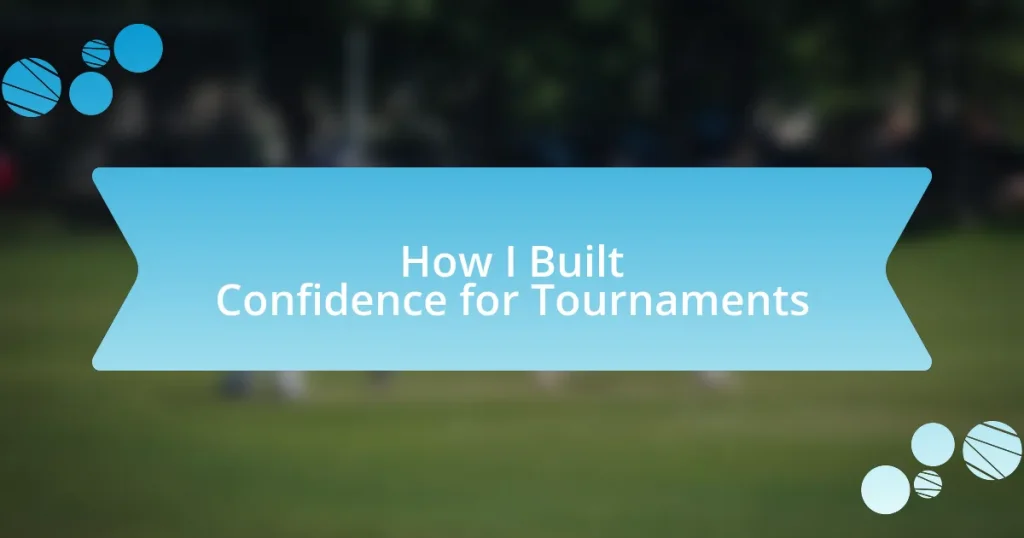Key takeaways:
- Shifting mindset from fear to opportunity enhances performance and builds confidence.
- Setting realistic, flexible goals reduces anxiety and fosters a positive experience in tournaments.
- Consistent practice routines and visualization techniques prepare athletes to face challenges with composure.
- Building a supportive network and practicing self-compassion are crucial for overcoming setbacks and maintaining motivation.
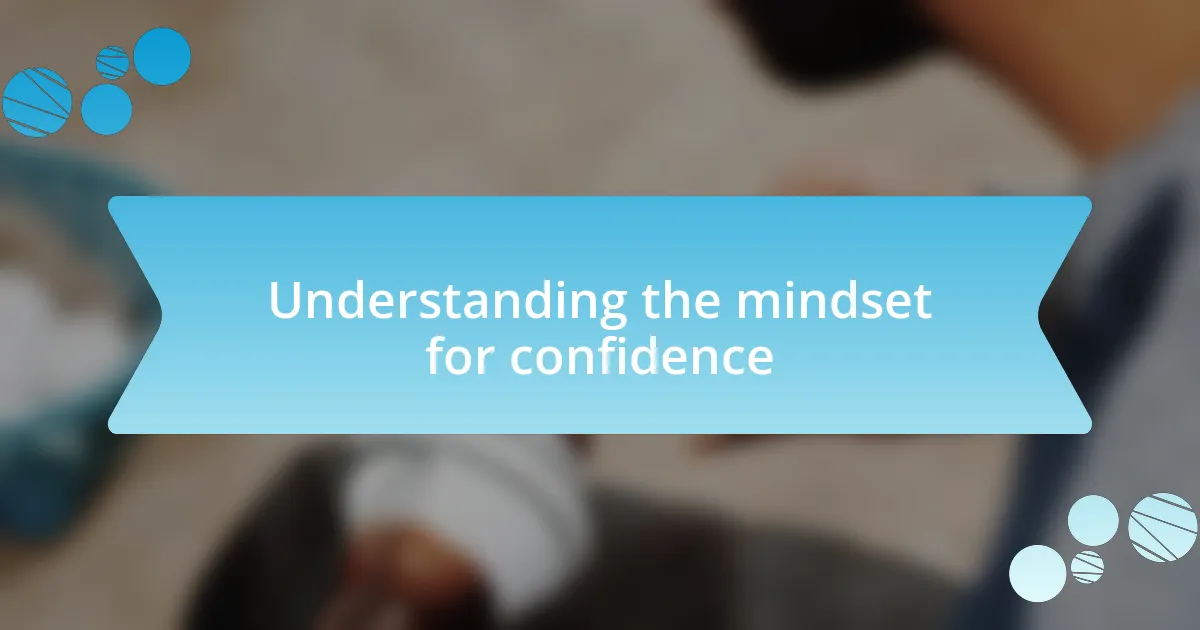
Understanding the mindset for confidence
Building confidence for tournaments starts with understanding that mindset is everything. I vividly remember a tournament where I was overwhelmed with nerves. Instead of allowing fear to take over, I shifted my focus to what I could control—my preparation and strategy. I asked myself, “What if I view this as an opportunity to showcase my hard work rather than a test of my worth?” That change in perspective made a world of difference.
In my experience, cultivating a positive mindset is about replacing negative self-talk with affirmations. I’ll never forget the time I caught myself doubting my abilities right before a match. I took a moment to breathe deeply and recalled my previous successes. This simple act of self-affirmation not only calmed my nerves but also empowered me to perform at my best. Have you ever tried to silence that inner critic? It can be a game-changer.
Moreover, understanding that setbacks are part of the journey fosters resilience. I think back to the times I’ve faced disappointments and how they initially felt devastating. However, I learned to view them as learning experiences, and this reframing helped build a more robust self-image. When I approached tournaments with the mindset that every match was a chance to grow, I felt liberated and confident. Isn’t it intriguing how our perceptions can shape our experiences?
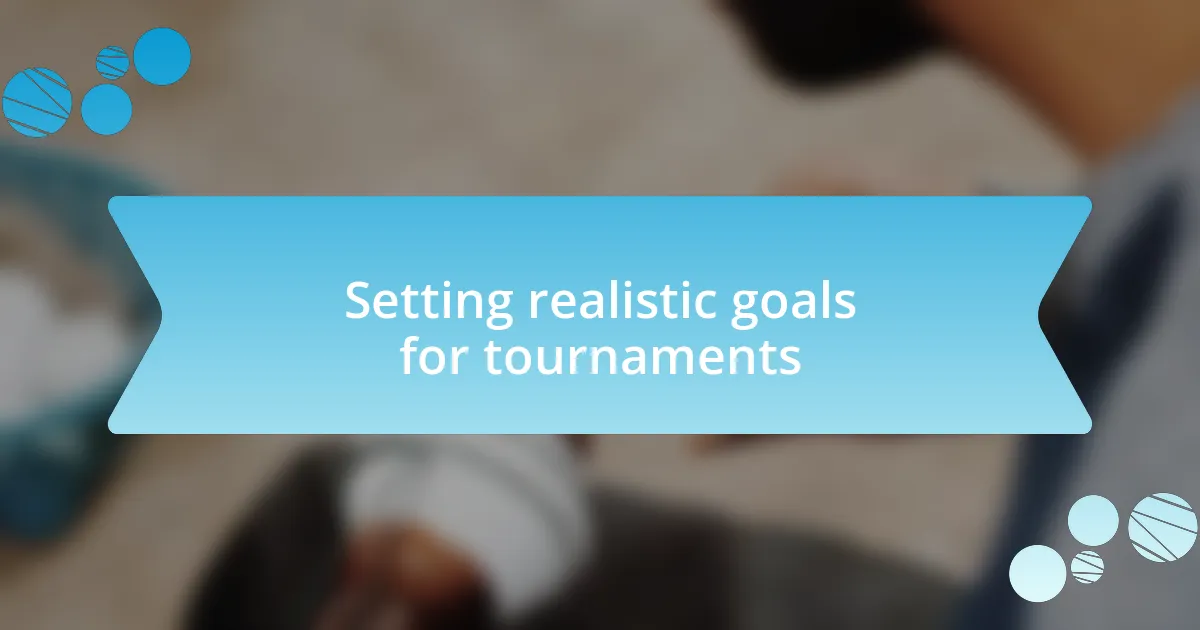
Setting realistic goals for tournaments
Setting realistic goals for tournaments is crucial for maintaining a healthy level of confidence. I remember one particular tournament where I aimed to win it all, which only amplified my anxiety. Instead, I decided to set smaller, achievable goals, like improving my technique or learning from each opponent. This shift in focus not only calmed my nerves but also made the experience enjoyable.
When setting goals, it’s essential to consider what is genuinely attainable within your current skill level. Early in my competitive journey, I often aimed too high and faced disappointment after disappointment. I learned that breaking down larger ambitions into manageable steps, like mastering specific plays or enhancing my physical conditioning, provided me with a roadmap for success. Each small accomplishment gave me a boost of confidence, making the overall journey much more rewarding.
It’s also vital to stay flexible with your goals. I once entered a tournament with a specific outcome in mind but quickly realized I needed to adapt my strategy based on the competition I faced. This experience taught me that while goals are important, the ability to adjust them in response to circumstances keeps your confidence intact. Have you considered how adapting your goals could enhance your performance? Reflecting on this can lead to more fulfilling tournament experiences.
| Goal Type | Examples |
|---|---|
| Short-term Goals | Improve technique in specific plays |
| Medium-term Goals | Consistent practice schedule leading up to tournaments |
| Long-term Goals | Achieve ranking in the top tier of competitors |
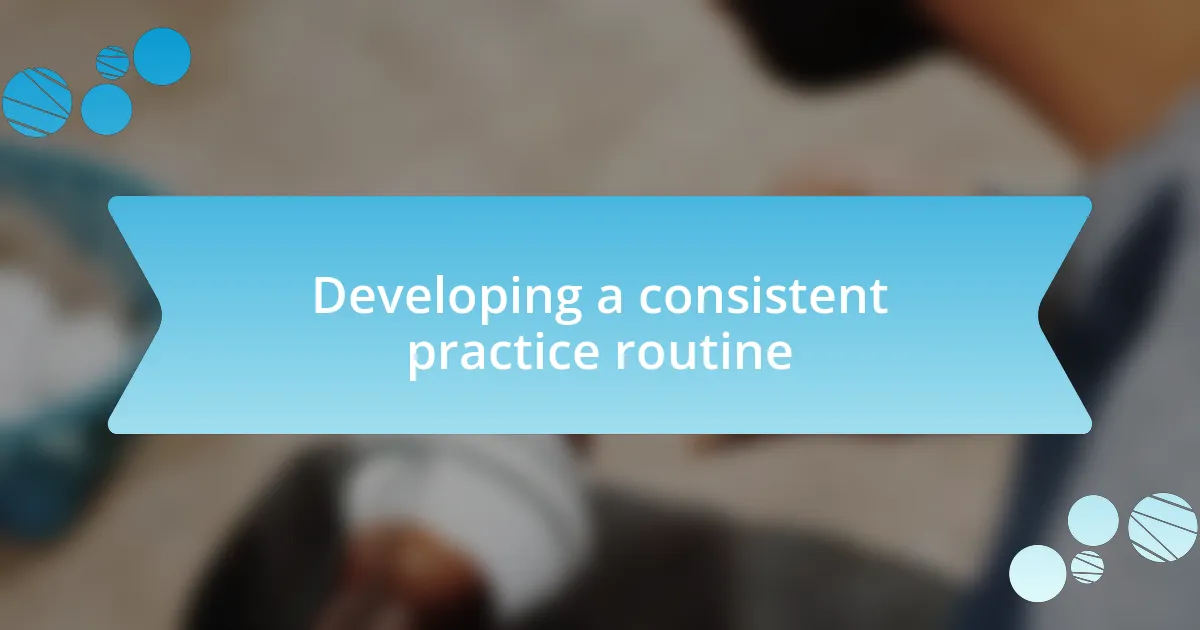
Developing a consistent practice routine
Establishing a consistent practice routine was transformative for my confidence during tournament seasons. I remember the early days when I would practice irregularly, and my nerves spiraled as the competitions approached. Gradually, I learned that dedicating specific times each week to hone my skills made a remarkable difference. That structure not only improved my performance but also allowed me to enter tournaments with a clear mind.
To create an effective practice routine, consider these steps:
- Set specific practice times: Designate certain days and hours solely for practice to create a habit.
- Focus on skills: Dedicate time to various aspects of your performance, such as technique, strategy, and physical fitness.
- Review and adjust: Regularly assess your progress and tweak your routine to address areas of improvement.
- Incorporate variety: Keep your practice engaging by mixing drills, gameplay, and review sessions to maintain enthusiasm.
- Track your progress: Maintain a journal or log of your practice sessions and achievements to visualize your growth.
By following these guidelines, I discovered a rhythm that helped me approach tournaments with anticipation rather than dread. In the end, it makes a tremendous difference when you enter a competition knowing you’ve put in the hours and effort.

Visualizing success for better performance
Visualizing success has been a game-changer for my performance in tournaments. In those moments leading up to a competition, I would often picture myself executing perfect moves, finding success in every scenario. It’s a powerful tool; when I visualize these wins, it not only boosts my confidence but also calms my nerves. Have you ever noticed how that mental imagery can create a sense of familiarity with high-pressure situations?
I remember a particularly daunting tournament when self-doubt crept in. Instead of succumbing to anxiety, I closed my eyes and vividly imagined myself on stage, receiving applause after a flawless performance. This practice transformed the overwhelming fear into excitement. It felt as though I had already succeeded in my mind, and that translated into my actual performance. Isn’t it remarkable how our thoughts can shape our reality?
Incorporating visualization into my routine also helped me identify and prepare for obstacles I might face during the tournament. I would visualize not just the victories, but the challenges that could arise, and imagine myself overcoming them with poise. By practicing these mental scenarios, I developed a better strategy and maintained my composure under pressure. This technique has become essential for me—how do you think it could impact your experience?
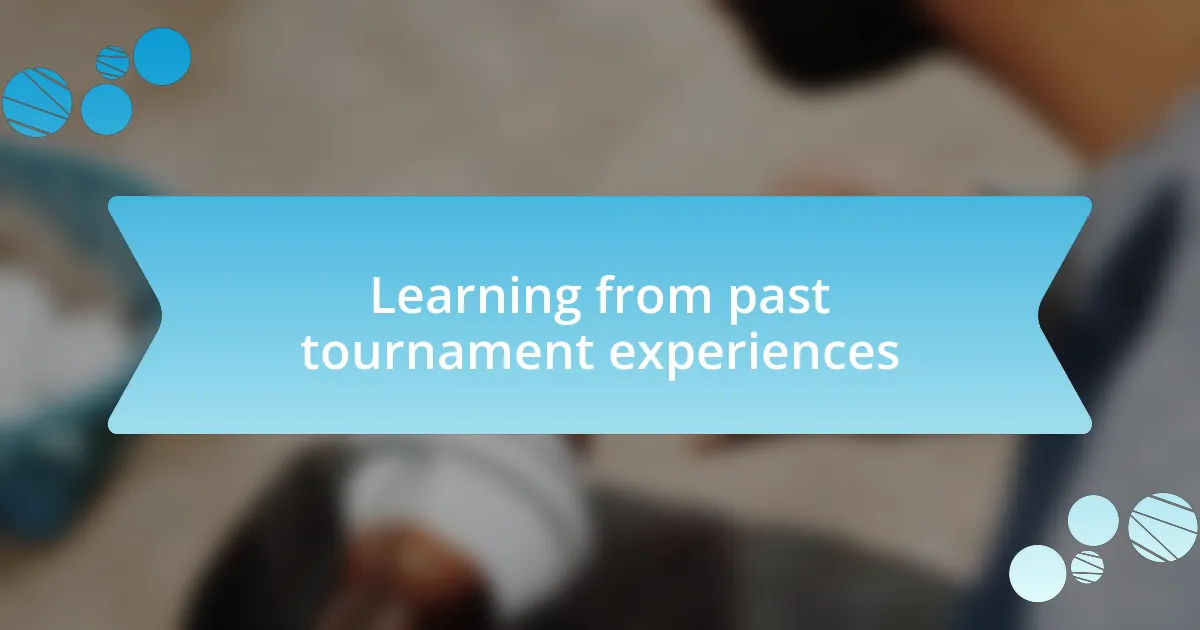
Learning from past tournament experiences
Reflecting on past tournament experiences is crucial to building confidence. I can recall a time when I choked during a match, forgetting half of my routine. The embarrassment lingered long after the event, but I took that pain and turned it into a lesson. Instead of avoiding memories of that day, I faced them head-on. What went wrong? I evaluated my preparation, my mindset, and even the distractions that might have affected me.
Each tournament, good or bad, is a stepping stone toward improvement. I remember dissecting my performances with a journal, noting moments when I felt strong versus when I faltered. By doing this consistently, I uncovered patterns that revealed my triggers for anxiety. It’s fascinating how understanding these nuances helped shift my focus from fear of failure to excitement for progress. Have you ever tried analyzing your own experiences this way?
Adapting my strategies based on lessons learned propelled me to new heights. After a particularly tough competition, I tweaked my warm-up routine and even changed my pre-tournament meals. Surprisingly, these small adjustments led to notable improvements. Analyzing past performances not only illustrates what to maintain but also what to change. Would you believe how much insight we can gain just by looking back?
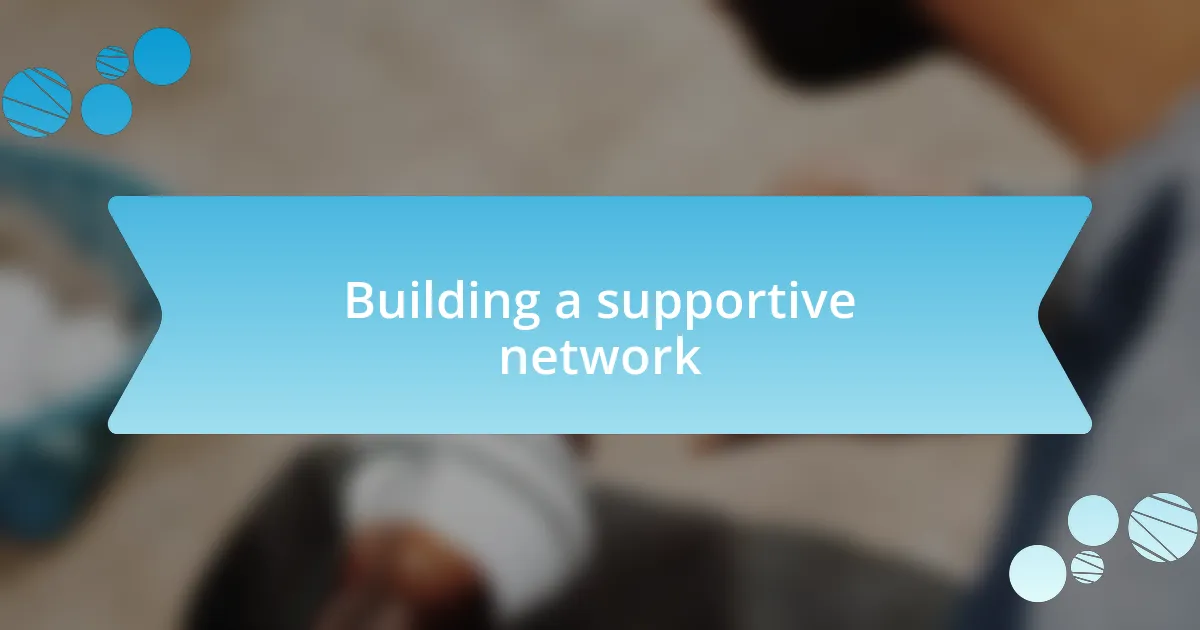
Building a supportive network
Building a supportive network is one of the strongest pillars of confidence. I vividly remember the time I reached out to a fellow competitor after feeling overwhelmed at a tournament. Initially hesitant, I found that opening up about my struggles not only eased my anxiety but also forged a genuine friendship that offered encouragement and accountability. Have you ever considered how such connections can uplift you during challenging moments?
Surrounding myself with a diverse group of supportive individuals made a significant difference in my mindset. I sought mentors who had faced similar challenges and learned from their experiences. Listening to their stories of perseverance filled me with hope and renewed determination. It’s incredible how a few motivating words from someone who understands your journey can spark an internal fire. Have you thought about who inspires you?
I can’t stress enough the importance of maintaining regular communication within my network. We often share our wins and losses, and it fosters an environment of learning and growth. Just last week, my training partner and I met to discuss our upcoming tournaments. Sharing our strategies and even our fears gave me a clearer perspective on my own challenges. It’s amazing how collective experiences can lead to personal breakthroughs, isn’t it?
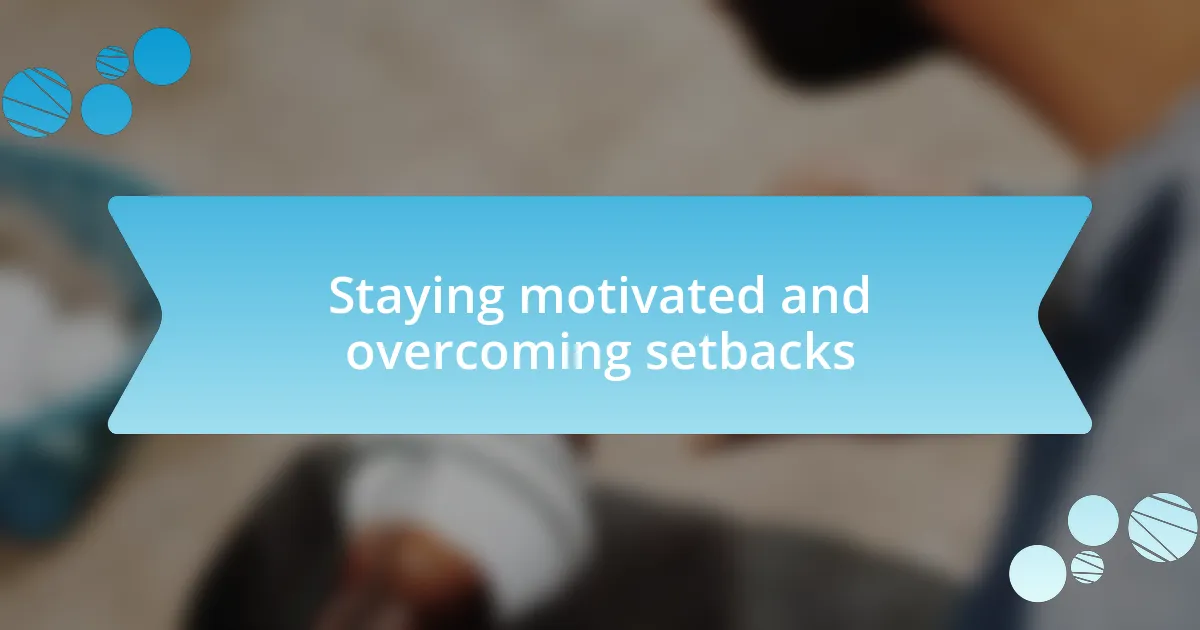
Staying motivated and overcoming setbacks
Staying motivated during tournaments can be quite the challenge, especially after a setback. I remember a particular tournament where I had an unexpected loss; it felt like a punch to the gut. I had to remind myself that setbacks are simply setups for comebacks. It took a few days and some self-reflection to shift my focus from disappointment to determination. How often do we allow one moment to define our entire journey?
To overcome setbacks, I started setting small, achievable goals to help rebuild my confidence. For instance, after that loss, I dedicated myself to mastering one specific skill each week. It was astonishing how those small victories could lift my spirits and reignite my passion. Isn’t it fascinating how momentum builds with each small win?
One of the most important lessons I’ve learned is the power of self-compassion. It’s easy to be harsh on myself after a setback, but I realized that treating myself with kindness makes a world of difference. Instead of dwelling on mistakes, I began to celebrate my efforts and remind myself that perseverance is part of the process. Have you ever found that a little self-forgiveness can lead to greater resilience?










